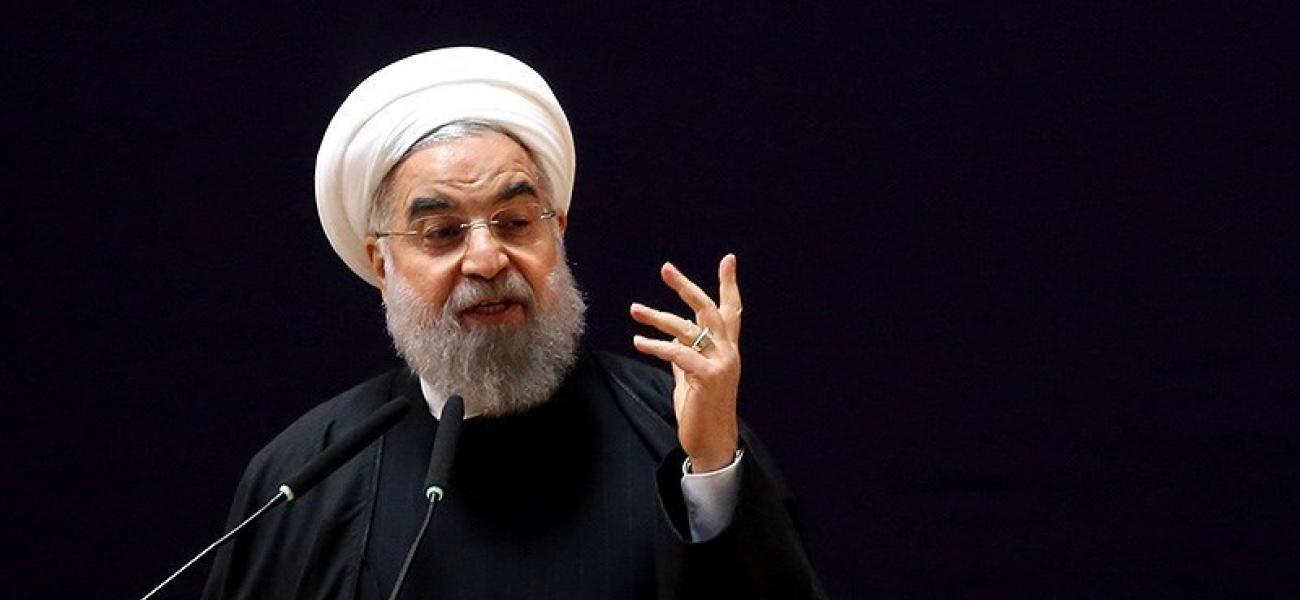
Survey: What Next for the Iran Deal and What Will It Mean for US-Russian Relations?
This week President Donald Trump announced the U.S. withdrawal from the international nuclear agreement with Iran, officially known as the Joint Comprehensive Plan of Action, or JCPOA, signed in 2015 by the U.S., Iran, Russia, China, France, Germany, the U.K. and the EU. Though implementation will take months, Trump’s decision includes the re-imposition of Washington’s sanctions, which had been lifted by the deal. One former U.S. official has predicted that what follows for the accord will be “death by a thousand cuts.”
In announcing the decision, the White House said that the “unacceptable” deal “failed to protect America’s national security interests[,] … enriched the Iranian regime and enabled its malign behavior.” The withdrawal from the JCPOA, it added, will pressure Iran “to alter its course of malign activities and ensure that Iranian bad acts are no longer rewarded,” while also helping “ensure global funds stop flowing towards illicit terrorist and nuclear activities.” Opponents of the decision have countered that Iran has been in compliance with the JCPOA and that the deal, although far from perfect, has greatly stalled Tehran’s nuclear-weapons program. Many have also argued that the U.S. withdrawal hands a victory to Iran’s hardliners.
Initial reactions from other signatories have been tinged with anger and disappointment, but also some hope that the deal can last. Iran’s President Hassan Rouhani quickly responded that Iran will attempt to negotiate a continuation of the agreement with its remaining members, all of whom expressed their willingness to maintain the arrangement absent the United States. A senior Russian diplomat, one of Moscow’s top negotiators in JCPOA talks, called for a summit meeting between Trump and President Vladimir Putin and flew to Iran. Meanwhile, Iran’s parliament speaker, Ali Larijani, reportedly urged his country to prepare for the "resumption of all aspects of nuclear activities," and Iranian lawmakers set a paper U.S. flag on fire, shouting, "Death to America!"
What comes next? Can the deal, or some aspects of it, be saved? We ask eight experts on nuclear nonproliferation and on the Middle East to explain the implications of Trump’s decision for Russia, U.S.-Russian relations and global security.
1. Now that Trump has announced his decision, what next steps can we reasonably expect from the deal’s other signatories?
 Martin Malin
Martin Malin
Executive Director, Managing the Atom Project, Belfer Center for Science and International Affairs, Harvard Kennedy School
The resumption of U.S. nuclear sanctions on Iran will deepen the divide between the United States and Europe. European banks and businesses will cancel current contracts with Iran to avoid U.S. penalties (limiting further Iran’s benefits from the deal, and hence undercutting the viability of a continuation of the JCPOA without the United States). But European governments, angered by the prospect of sanctions on their companies, will begin to look for ways to retaliate against an unreliable and increasingly malevolent United States. This could take the form of EU political and economic sanctions against the U.S., along with efforts to indemnify European companies from losses due to U.S. sanctions enforcement. The impact of such measures will not be immediate. But the transatlantic political crisis—against the background of U.S. protectionism, Trump’s withdrawal from the Paris climate accords and Trump’s earlier equivocation on U.S. commitments to NATO—will have broad repercussions. China, amidst escalating tensions over trade with the United States, may seek to increase its energy purchases from Iran to cushion the blow of new U.S. sanctions. Russia has also stated that it will try to keep the JCPOA afloat, and warned that the U.S. action may put negotiations with North Korea at risk.
 Jon Wolfsthal
Jon Wolfsthal
Associate, Managing the Atom Project, Belfer Center for Science and International Affairs; Former Special Assistant to the U.S. President for National Security Affairs; Former Senior Director, National Security Council
The immediate reaction will be in Europe, where states will seek to insulate their own companies from U.S. sanctions. It is likely that France and the UK will appeal to Trump personally to avoid sanctions from affecting them, raising a serious challenge with regard to favoritism. Germany, whose Chancellor Merkel has not forged a direct personal relationship with President Trump, is likely to suffer. I think we will also begin to see Iran seek to leverage the U.S. decision to its advantage, asking for Europe to compensate it for America’s violation of the deal.
 Mark Katz
Mark Katz
Professor of Government and Politics, George Mason University Schar School of Policy and Government; 2018 Sir William Luce Fellow, Durham University, U.K.
Moscow probably will not do much beyond expressing disappointment at present. Just as George W. Bush’s determination to intervene in Iraq with or without U.N. Security Council approval divided the Western alliance, so does Trump’s withdrawal from the JCPOA. This is something Putin will welcome, in the hope that he can take advantage of differences between the U.S. and Europe on this issue. That said, Moscow may offer to mediate between the U.S. and Europe, as some Russian commentators suggested Russia should do at the height of the disagreement over Iraq between the U.S. and UK on one hand and France and Germany on the other.
2. How could termination of the deal by the U.S. affect U.S.-Russian relations?
 Gary Samore
Gary Samore
Executive Director for Research, Belfer Center for Science and International Affairs, Harvard Kennedy School; Former White House Coordinator for Arms Control
President Trump’s decision to renege on the Iran nuclear deal has mixed blessings for Moscow. On one hand, Moscow will try to exploit tensions in transatlantic relations, as Washington tries to inflict economic damage on Iran by imposing secondary sanctions on European companies doing business with Iran and the European governments try to salvage the deal by maintaining trade and investment with Iran. As this transatlantic tension over Iran escalates, Moscow hopes it will infect and undermine transatlantic cooperation on issues of direct interest to Russia, such as Ukraine sanctions against Russia. On the other hand, Moscow will fear that collapse of the nuclear deal will intensify fighting between Israel and Iran in Syria (which Russia is trying to contain) and ultimately increase the risk of a U.S. attack on Iran’s nuclear facilities if Iran moves to accelerate its nuclear activities. To avoid this risk, Russia will try to salvage the nuclear deal in the absence of U.S. participation.
Mark Katz
While Russia certainly does not want Iran to obtain nuclear weapons, it was never as zealous about preventing this as the U.S. and its various allies have been. Russia was never likely to be the target that a nuclear-armed Iran had in mind. So Trump’s withdrawal from the JCPOA does not deprive Moscow of something that it desperately wanted. On the contrary, increased Iranian-American hostility will tend to make Tehran more dependent on Moscow. And Moscow is content to let America’s Western allies take the lead in berating the Trump administration on this particular issue. Trump’s move on the JCPOA will also support Putin’s efforts to portray the U.S. as erratic and irresponsible. That said, while Russia might welcome the disarray within the Western alliance caused by Trump’s withdrawal from the JCPOA, any move by the Trump administration to attack Iran will lead to an acute crisis in Russian-American relations.
 Simon Saradzhyan
Simon Saradzhyan
Director, Russia Matters; Assistant Director, U.S.-Russia Initiative to Prevent Nuclear Terrorism, Belfer Center for Science and International Affairs
Trump’s decision makes the situation somewhat more dangerous for Russia because it increases the probability that the U.S. and some of its allies (for example, Israel) could go to war with Iran, but I think that probability will remain low because Tehran will probably try to avoid doing anything that gives Trump a pretext for attempting such a war, like resuming production of highly enriched uranium. Instead, Tehran has already stated that it intends to negotiate with China, Russia and European powers for an arrangement in which they all continue to honor the deal, in the hope that Trump will not get reelected in 2020.
In addition to somewhat increasing the chances of war in the Greater Middle East, which would destabilize the region in ways that will negatively impact Russia, Trump’s decision creates yet another point of contention between the Kremlin and the White House. That’s bad news given that the two countries already do not see eye to eye on many issues and have to manage fallout from the U.S. sanctions on Russia, as well as chances of accidental conflict. Despite some benefits that Russia can derive from Trump’s decision, the overall costs outweigh them for now. Finally, if tensions between Washington and Tehran escalate to the point where a real possibility of war between the two emerges, then Russia could theoretically be expected to try to step in and mediate de-escalation; in the short term, however, it is not realistic to expect Iran to heed Trump’s call to negotiate a new deal. The previous one took many years to negotiate and required many compromises, so there’s little if any desire in Tehran, I think, for negotiating anew.
3. EU officials have hinted that if there’s one thing that can put the EU and Russia on the same side, uniting them against the U.S., it’s elimination of the Iran Deal. Do you think that can happen?
 Paul Saunders
Paul Saunders
Executive Director, Center for the National Interest
Not really. What does it mean to “put the EU and Russia on the same side”? Would the EU drop sanctions on Russia over Moscow’s intervention in eastern Ukraine and annexation of Crimea? Would the EU modify its third energy package of regulations so that Russia’s gas monopoly Gazprom would not have to separate its production and transmission businesses? Would the EU decide to offer financial support to the Assad regime to reconstruct Syria? None of this seems very likely.
The EU and Russia might both oppose the Trump administration’s decision to withdraw from the Iran agreement, but it is not clear what this would mean in practice. Even on that narrow issue, the EU will have powerful motives to try to re-negotiate the nuclear deal to get Washington back on board. Moscow has not indicated any willingness to put pressure on Tehran to accept new concessions.
Jon Wolfsthal
I think that states in Europe concerned about Russia will remain concerned about Russia and those positively inclined will remain so. I don’t see much of a political alignment based on the Iran deal. However, to the extent that Russia financially benefits from the U.S. withdrawal and becomes more central in the Iranian economy, some European states might do more business with Iran and Russia together.
4. Some argue that Russia would benefit economically if the deal falls through since oil prices would rise. Do you think the Kremlin factors that in and, if so, does this benefit outweigh the costs for Russia?
Simon Saradzhyan
Trump’s decision pushes oil prices higher because traders expect sanctions to curtail Iran’s oil exports: Even if the deal’s other signatories continue to honor the JCPOA, U.S. sanctions may force European buyers to stop buying Iranian oil. But the overall costs for Moscow, as I’ve said before, outweigh the benefits. Plus, with a war in Syria on its hands, and the growing risks of Israeli-Iranian hostilities there, the last thing Russia needs is a bigger armed conflict between Iran and the U.S., Israel and other opponents of Tehran (e.g., Saudi Arabia) in Iran itself.
5. What do you think of French President Emmanuel Macron’s idea of a complementary deal that would address Iranian missile development and Tehran’s military intervention in the Middle East? Is that doable?
 William Tobey
William Tobey
Director, US-Russia Initiative to Prevent Nuclear Terrorism, Belfer Center for Science and International Affairs, Harvard Kennedy School
To obtain changes in Iranian policy that would curb Tehran’s missile-development programs and regional aggression would require incentives, disincentives, or likely both. I see no near-term prospect of applying sufficient pressure on Tehran to change materially either its missile-development or regional policies. If the Trump administration can reassemble effective sanctions against Iran—which previously cut dramatically oil exports and cut off access to international financial markets—it might be possible to modify Tehran’s behavior, but this will be a tall order.
Jon Wolfsthal
This idea was viable as long as the JCPOA was in force. I think it is now dead.
6. What could be the impact of Trump’s Iran Deal decision on the tensions with North Korea?
 Joshua Pollack
Joshua Pollack
Senior Research Associate, James Martin Center for Nonproliferation Studies, Middlebury Institute of International Studies at Monterey; Editor, The Nonproliferation Review
My sense is that the president's action on the Iran deal will not give the North Koreans serious pause. They have made clear in the past that they do not consider the JCPOA to be a precedent applicable to them. Kim Jong Un has courted Moon Jae-in assiduously since the start of 2018, and it appears to me that he will continue to do so. All available indications are that the North Koreans consider the Americans a sideshow to the main act, which is inter-Korean—as the North Koreans like to say, "our nation by itself." So I doubt they have any plans to concede anything of substance to the U.S. to begin with. If I'm wrong about that, of course, then the manifest unreliability of the U.S. as a bargaining partner would probably give Kim serious pause.
Jon Wolfsthal
I worry that Trump will seek to cut a North Korean deal at any price to show he can cut deals and to compensate for the fallout of the JCPOA violation. I also worry that the North Koreans have yet another advantage over us and that the Trump administration will accept much less than we should.
7. Israeli Prime Minister Benjamin Netanyahu made a high-profile presentation last month about Iran’s “lies” concerning its nuclear ambitions; however, some experts have written that none of the information he offered seemed new. How does Israel fit into the JCPOA picture today?
William Tobey
I do not accept that “none of the information is new,” and I find it very unlikely that any outside expert could know this. The sheer size of the cache—55,000 pages of documents and 183 CDs with information about Iranian nuclear-weapons-development activities—would indicate at least some details previously unknown to governments. Moreover, when the International Atomic Energy Agency repeatedly asked Tehran about its weaponization activities under the rubric of the so-called “possible military dimensions” of Iran’s nuclear program, they were met with wholesale denials. Even the small amount of information released by the Israelis appears to contain new revelations, such as mention of an underground facility to manufacture and assemble nuclear weapons parts. The IAEA should have the opportunity to investigate this information, and if it is confirmed, to oversee the removal or rendering unusable of any such equipment or facilities. This is required under Iran’s Safeguards Agreement and Additional Protocol, regardless of the status of the JCPOA.
Paul Saunders
It was striking to see Israeli Prime Minister Benyamin Netanyahu as a very high-profile guest at Russia’s May 9 Victory Day parade (commemorating the USSR’s victory in World War II) in Moscow, walking side by side with Vladimir Putin. This happened at almost the same time that Israel’s air force was attacking Iranian targets throughout Syria. And it is important to remember that when then-President Dmitry Medvedev signed a decree blocking Russia’s delivery of S-300 missiles to Iran—after Iran had already paid—many viewed this as an accommodation of Israel’s concerns as much as an effort to reach out to the United States. Russia’s cooperative relationships with both Israel and Iran could be an opportunity for Putin to broker some kind of understanding. Or it could force Moscow to make some unpleasant choices that Russia has so far avoided in its friends-with-everyone Middle East policy. We’ll see.
Jon Wolfsthal
Israel and Netanyahu are not one and the same. The entire Israeli security establishment wanted the JCPOA to remain in force. There is no question in my mind that Netanyahu and U.S. national security advisor John Bolton and Secretary of State Pompeo coordinated the “atomic archive” presentation to give Trump a hook on which to blame the JCPOA withdrawal.
Mark Katz
Netanyahu’s reiteration of this old information as if it were new intelligence was designed to egg Trump on in withdrawing from the JCPOA. He claims to believe that Iran is determined to acquire nuclear weapons, that it only signed the JCPOA to “lull the West into complacency” about its true intentions, and that Tehran will threaten or even attack Israel with nuclear weapons once it acquires them. But if the JCPOA completely collapses, the restraints on Iran's attempts to acquire nuclear weapons—and to do so sooner rather than later—will be drastically reduced if not eliminated. Netanyahu, though, may hope to prevent this with the use of force. If so, he would prefer that this task be undertaken not by Israel, but by the U.S.
Photo by Mahmoud Hosseini shared by the Tasnim News Agency under a CC BY 4.0 license.
The opinions expressed in this survey are solely those of the respondents.

